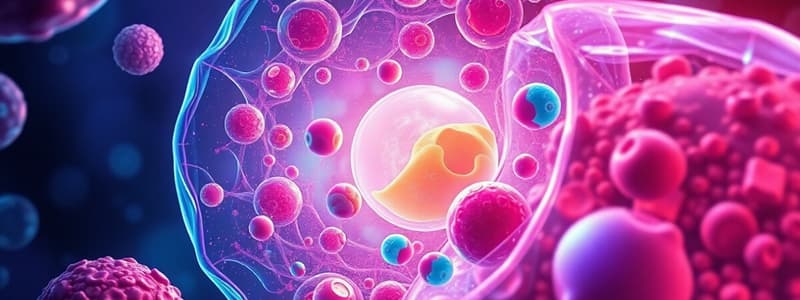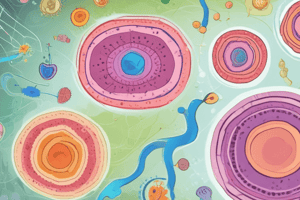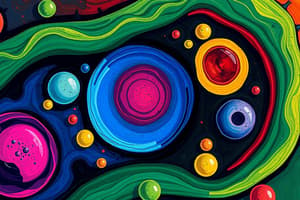Podcast
Questions and Answers
What defines a prokaryotic cell?
What defines a prokaryotic cell?
- It has a well-defined nucleus.
- It lacks a nucleus. (correct)
- It is larger than eukaryotic cells.
- It contains membrane-bound organelles.
What is the function of the cell membrane?
What is the function of the cell membrane?
- To facilitate cell division.
- To control movement of substances in and out of the cell. (correct)
- To provide energy for cellular processes.
- To store genetic information.
Which part of the cell acts as the control center?
Which part of the cell acts as the control center?
- Nucleus (correct)
- Cell Membrane
- Cytoplasm
- Cell Wall
Which type of cell is generally found in organisms like bacteria?
Which type of cell is generally found in organisms like bacteria?
In what year was the cell first discovered?
In what year was the cell first discovered?
What component is primarily responsible for transmitting genetic information across generations?
What component is primarily responsible for transmitting genetic information across generations?
Which of the following is a distinguishing feature of plant cells compared to animal cells?
Which of the following is a distinguishing feature of plant cells compared to animal cells?
What is the largest known type of cell?
What is the largest known type of cell?
Which of the following cells is responsible for immune response in the body?
Which of the following cells is responsible for immune response in the body?
What term describes the living substance of a cell that includes both cytoplasm and nucleoplasm?
What term describes the living substance of a cell that includes both cytoplasm and nucleoplasm?
What is the primary function of ribosomes in a cell?
What is the primary function of ribosomes in a cell?
Which component of the cell is responsible for producing ribosomes?
Which component of the cell is responsible for producing ribosomes?
What distinguishes rough endoplasmic reticulum from smooth endoplasmic reticulum?
What distinguishes rough endoplasmic reticulum from smooth endoplasmic reticulum?
What is the main role of lysosomes in the cell?
What is the main role of lysosomes in the cell?
Which type of organism is composed of only one cell?
Which type of organism is composed of only one cell?
Flashcards are hidden until you start studying
Study Notes
Cell Structure
- Cell Membrane: Outer layer that controls movement of substances in and out of the cell.
- Cytoplasm: Jelly-like substance where organelles are located.
- Nucleus: Central control center containing DNA.
- Nuclear Membrane: Surrounds the nucleus, allowing passage of materials in and out.
- Nucleolus: Produces ribosomes.
- Ribosomes: Site of protein synthesis, located both on the rough endoplasmic reticulum (ER) and within the cytoplasm.
- Mitochondria: Powerhouse of the cell, responsible for cellular respiration and producing energy (ATP).
- Endoplasmic Reticulum (ER):
- Rough ER: Studded with ribosomes, involved in protein synthesis.
- Smooth ER: Synthesizes lipids.
- Golgi Complex: Stacked membranes that process, package, and distribute proteins.
- Lysosomes: Contain digestive enzymes for breaking down cellular waste.
- Vacuoles: Storage organelles for nutrients, waste products, and other substances; larger in plant cells.
Types of Cells
- Prokaryotic: Lack a nucleus (e.g., bacteria).
- Eukaryotic: Have a nucleus (e.g., plants, animals).
Organisms
- Unicellular Organisms: Made up of a single cell (e.g., bacteria, amoeba, yeast).
- Multicellular Organisms: Made up of many cells (e.g., humans, plants, animals).
Tissue and Organ Structure
- Tissues: Groups of similar cells working together.
- Organs: Different tissues working together to perform a specific function.
- Organ Systems: Multiple organs working together.
- Organism: A complete living being.
Chromatin
- Structure made of DNA and proteins.
- Located in the nucleus of a cell.
- Chromosomes are formed from chromatin.
- Responsible for transmitting genetic information from one generation to the next.
Cell Size and Shape
- Largest Cell: Ostrich egg, about 10mm.
- Smallest Cell: PPLO (Pleuropneumonia-like organism), about 0.1mm.
- Cell shape is influenced by environmental conditions and function.
Types of Cells in the Body
- Red blood cells: Carry oxygen throughout the body.
- White blood cells: Fight infections.
- Muscle cells: Responsible for movement.
- Neuron cells: Transmit nerve impulses.
- Stem cells: Undifferentiated cells that can develop into different types of cells.
Difference Between Animal and Plant Cells
| Animal Cell | Plant Cell |
|---|---|
| Generally round or irregular | Have a fixed shape |
| Chloroplast is absent | Chloroplast is present |
| Have small, temporary vacuoles | Have large, central vacuoles for storage |
Protoplasm
- The living substance of the cell, consisting of cytoplasm and nucleoplasm.
Studying That Suits You
Use AI to generate personalized quizzes and flashcards to suit your learning preferences.




